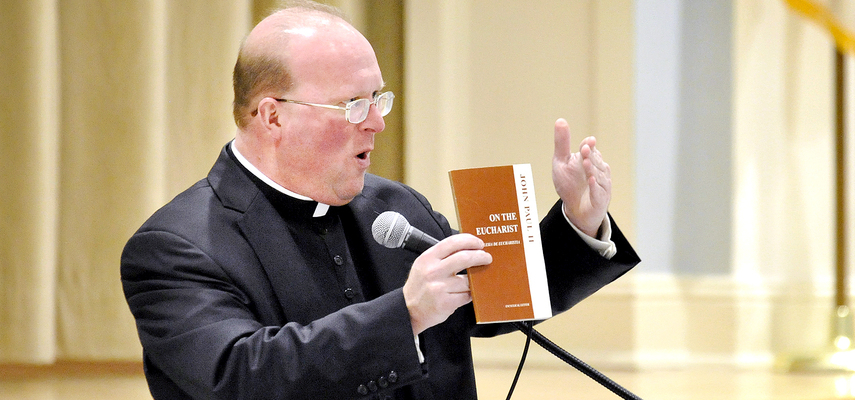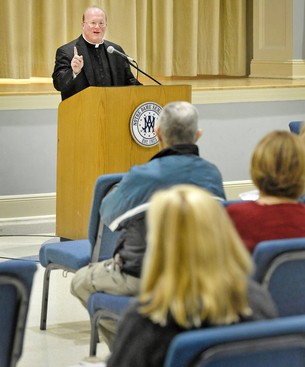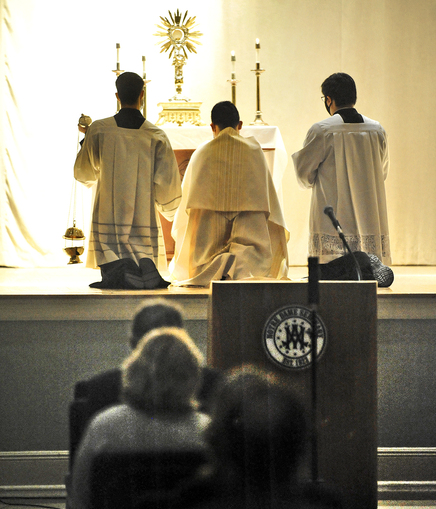
A platform that encourages healthy conversation, spiritual support, growth and fellowship

NOLACatholic Parenting Podcast
A natural progression of our weekly column in the Clarion Herald and blog

The best in Catholic news and inspiration - wherever you are!
Eucharist means we are blessed, broken, sent
-

By Peter Finney Jr.
Clarion Herald
Father James Wehner, rector-president of Notre Dame Seminary, opened a yearlong Eucharist Lecture Series by acknowledging that the truth of the real presence of Christ in the Eucharist may be disregarded today because the moral authority of the church has been questioned due to the clerical sexual abuse crisis.“When the Catholic Church proposes the Gospel in its entirety, is it sometimes coming from priests who have abused children and, therefore, the teaching is invalidated?” he asked the live audience of about 60, with another 100 watching via livestream. “Is it coming from a church where its teachings in the 21st century seem archaic, and those teachings have expired?
“So, if the Catholic Church’s moral authority, its teaching authority, is falling on deaf ears, is it hard for Catholics to even believe in the centrality of who we are as Catholics?”
Father Wehner said it would be helpful for Catholics to read Pope John Paul II’s short book, titled “On the Eucharist,” to gain a new perspective on their eucharistic faith.
No church without Eucharist
“We have no church without the Eucharist; and without the priesthood, there’s no Eucharist,” Father Wehner said, noting that Notre Dame Seminary began its academic year with its largest enrollment in history.
“The institution of the Eucharist takes place, as well as the priesthood, in the Upper Room and then, from that, springs forth the church,” Father Wehner said. “The church did not create the Eucharist. It’s the other way around. ... The Eucharist is the foundation of the church.”
 Father Wehner said even in the Garden of Eden – when Adam and Eve were living in the fullness of God’s love, “there is a desecration that occurs.”
Father Wehner said even in the Garden of Eden – when Adam and Eve were living in the fullness of God’s love, “there is a desecration that occurs.”He touched on the flood and the Israelites’ slavery in Egypt. At the Last Supper, when Jesus instituted the Eucharist, he was betrayed by Judas and later denied by Peter.
“And we come to the scandal of Good Friday – we tried to kill God,” he said. “In the midst of this desecration is the beginning of the Eucharist. ... What makes the mystical body of Christ mystical and unified is the Eucharist. The body will die without it, and that’s why we are so fervent about it.”
In the words of institution of the Eucharist from the Gospel of Matthew, Jesus “took” bread, “blessed” it, “broke” it and “gave” it to his disciples.
“When we go to Mass, we’re not spectators,” Father Wehner said. “We’re being drawn into the mystery, which means we, too, are being ‘taken’ into the mystery of Jesus. We’re being ‘blessed’ from the moment of creation into baptism. We’re being ‘broken.’ There’s no secret about that. ... To be a Christian means we’re going to be broken and then we are ‘given’ to the world.”
Father Wehner asked his listeners to examine their consciences.
“What are we giving to him?” he asked. “Where are we in life right now? What needs to be repaired, confessed, reconciled? How can you let God into your darkness? He wants to be there.”
In the end, Christ desires that people go forth and spread the good news of salvation, he said.
“That is the vocation of all of us, each in our own vineyards – go and tell the world the good news so that when Mass has ended, how is the Christian who is on fire with the body and blood of Christ going out to be a blessing to others?”
 The next monthly lecture for the Year of the Eucharist and St. Joseph is scheduled for Feb. 17 by Dr. Nathan Mastnjak on “The Eucharist in Sacred Scripture.” The evening starts at 5:30 p.m. with adoration, and the talk runs from 6 to 7 p.m.
The next monthly lecture for the Year of the Eucharist and St. Joseph is scheduled for Feb. 17 by Dr. Nathan Mastnjak on “The Eucharist in Sacred Scripture.” The evening starts at 5:30 p.m. with adoration, and the talk runs from 6 to 7 p.m.




